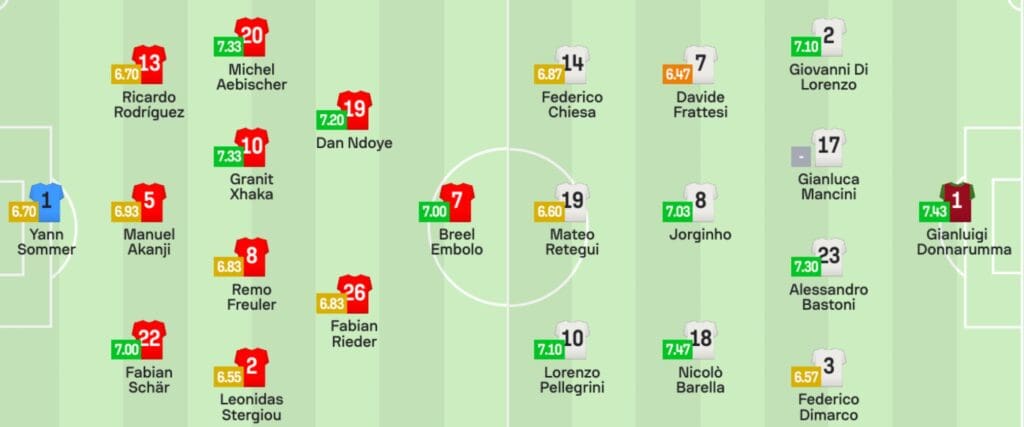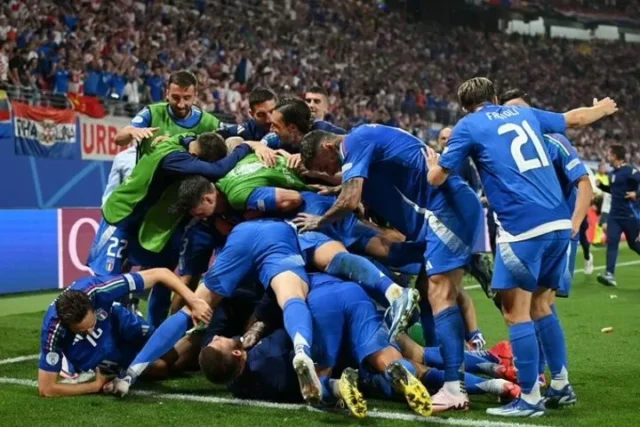Switzerland vs Italy Predictions for Saturday’s Euro 2024 last 16 showdown. Switzerland face Italy in Euro 2024 knockout phase in Berlin; winner meets England or Slovakia in the quarter-finals. Read on for all our free predictions and betting tips.


European Championship | Round of 16 – Jun 29, 2024 at 5pm UK at Olympiastadion Berlin

Don’t have a William Hill account? Click below to claim this offer👇
Switzerland vs Italy Predictions
Key Stats
– Switzerland have remained unbeaten in their group stage matches, showcasing their defensive solidity and resilience.
– Italy have scored in 14 of their last 16 competitive games, highlighting their offensive capabilities despite recent struggles.
– Breel Embolo’s return from injury has provided a significant boost to Switzerland’s attacking options, making him a key player to watch.
Switzerland vs Italy: Will Tactical Mastery Triumph in Berlin?
As Euro 2024’s knockout phase kicks off, the match between Switzerland and Italy at Berlin’s Olympiastadion promises to be a riveting encounter. With both teams having shown resilience and tactical prowess, the stage is set for a fierce battle to secure a place in the quarter-finals, where they will face either England or Slovakia.
Match Preview
Switzerland, who nearly topped Group A, were denied by a late goal from Germany in their final group stage match. Despite this, they remain unbeaten, with five points securing their progression. Their journey saw them start strong against Hungary, draw with Scotland, and display tenacity against Germany, illustrating their capability to challenge any side. Murat Yakin’s team have consistently reached the knockout rounds of major tournaments since 2014, though they often stumble at this stage.
Italy, meanwhile, had a tumultuous group phase, barely avoiding elimination. After a narrow win against Albania, a defeat to Spain, and a dramatic draw with Croatia, Italy’s qualification was in jeopardy until Mattia Zaccagni’s last-gasp equaliser secured their spot. Historically strong in the Euros, Italy’s form has been inconsistent, and they face pressure to perform under manager Luciano Spalletti.
Team News and Expected Lineups
Switzerland:
With Silvan Widmer suspended, Leonidas Stergiou is set to replace him in the Swiss defence. Breel Embolo, returning from injury, is expected to lead the attack, supported by Dan Ndoye and Ruben Vargas. The midfield will be anchored by Granit Xhaka and Remo Freuler, both pivotal in Switzerland’s tactical setup.
Switzerland’s probable starting XI:
Sommer; Schar, Akanji, Rodriguez; Stergiou, Xhaka, Freuler, Aebischer; Ndoye, Vargas; Embolo
Italy:
Italy also face defensive changes with Riccardo Calafiori suspended. Gianluca Mancini is likely to step in, with Spalletti possibly fluctuating between a back four and a three-man defence. Up front, Federico Chiesa and Mattia Zaccagni may start, given their recent performances, with Gianluca Scamacca or Mateo Retegui leading the line.
Italy’s probable starting XI:
Donnarumma; Darmian, Mancini, Bastoni; Di Lorenzo, Barella, Jorginho, Pellegrini, Dimarco; Chiesa, Scamacca
Tactical Analysis
Switzerland:
The Swiss team, under Yakin, blend solid defence with opportunistic attacks. Their midfield, led by Xhaka and Freuler, is adept at controlling the game’s tempo and breaking up opposition play. Embolo’s physicality and Ndoye’s pace provide a direct threat, complemented by Vargas’ creativity. Their 3-4-2-1 formation ensures width and defensive stability, crucial against Italy’s attacking threats.
Italy:
Spalletti’s Italy has struggled for consistency but remains dangerous. The midfield trio of Barella, Jorginho, and Pellegrini offers a blend of creativity and defensive cover. Chiesa and Zaccagni’s speed and flair on the wings can stretch any defence, while Scamacca’s presence in the box provides a focal point. Defensively, Italy must be wary of Switzerland’s counter-attacks and set-piece threats.
Tactical Analysis: Deep-Dive
Offensive and Defensive Strategies
In their recent matches, Switzerland have employed a balanced approach that combines solid defensive organisation with effective counter-attacking. Murat Yakin’s side typically set up in a 3-4-2-1 formation, ensuring defensive stability while maintaining the ability to transition quickly into attack. Key players such as Granit Xhaka and Remo Freuler anchor the midfield, providing both defensive cover and the ability to launch swift counter-attacks. Breel Embolo, returning to fitness, spearheads the attack, supported by the dynamic Dan Ndoye and Ruben Vargas. This trio’s movement and pace pose significant threats to opposition defences, as seen in their group stage matches where Switzerland averaged 10 shots per game with 4.7 on target.
Defensively, Switzerland rely on the solidity of Fabian Schär and Manuel Akanji at the back. Their ability to read the game and make crucial interceptions has been vital. The addition of Leonidas Stergiou, in place of the suspended Silvan Widmer, will aim to maintain this defensive robustness. Switzerland’s defence has shown resilience, conceding just three goals in the group stages, often absorbing pressure before launching counter-attacks.
Italy, under Luciano Spalletti, have oscillated between a back four and a three-man defence. This tactical flexibility aims to adapt to the opponents and game situations. In attack, Italy rely heavily on their midfield trio of Nicolò Barella, Jorginho, and Lorenzo Pellegrini. Barella, in particular, provides energy and creative spark, while Jorginho orchestrates play from a deeper position. Italy’s offensive strategy focuses on building play through the midfield and exploiting the flanks, with Federico Chiesa and Mattia Zaccagni providing width and pace.
Defensively, Italy have been less convincing. Their backline, comprising the likes of Gianluca Mancini and Alessandro Bastoni, has struggled with consistency, conceding three goals in the group stages. Gianluigi Donnarumma, though capable of spectacular saves, has been left exposed at times due to defensive lapses and errors leading to shots.
Individual Performances of Key Players
For Switzerland, Granit Xhaka’s leadership and midfield dominance have been crucial. His ability to disrupt the opposition’s play and initiate attacks has been a standout feature. Remo Freuler’s contributions, particularly his three assists, highlight his importance in linking defence and attack. Breel Embolo, despite his recent return from injury, has shown his significance with his physicality and goal-scoring ability, evidenced by his performance against Germany.
Italy’s standout performers include Nicolò Barella, whose work rate and creativity have been pivotal. Lorenzo Pellegrini has also been impressive, contributing both defensively and offensively, with his ability to score and assist making him a key player. Federico Chiesa’s pace and dribbling skills have provided Italy with an attacking outlet, crucial in breaking down defences.
Impact of Management on Style of Play and Performance
Murat Yakin has instilled a sense of resilience and tactical discipline in the Swiss team. His strategies emphasise defensive solidity combined with effective counter-attacks, making Switzerland a tough side to break down. Yakin’s ability to adapt his tactics based on the opponent has been crucial in Switzerland’s unbeaten run in the group stages.
Luciano Spalletti, on the other hand, has faced criticism for Italy’s inconsistent performances. While his tactical flexibility allows Italy to adjust to different game situations, it has also led to a lack of stability in their defensive setup. Spalletti’s preference for a possession-based game has sometimes slowed Italy’s attacking momentum, and his indecisiveness in settling on a consistent defensive formation has left the team vulnerable at the back.
Expected Goals (xG) Analysis
Switzerland’s attacking efficiency is reflected in their xG, with an average of 1.7 goals per game. Their ability to create and convert chances, particularly from inside the box, underlines their offensive threat. Players like Embolo and Ndoye, who can exploit defensive gaps, enhance their xG statistics.
Italy’s xG also highlights their offensive capabilities, averaging one goal per game. Despite their struggles, the potential for goals remains high due to the creative inputs from midfield and the presence of clinical finishers like Scamacca. However, their xG has been hampered by defensive errors and missed opportunities, which Spalletti needs to address.
Comparison of Tactics and Performances
Tactically, Switzerland’s disciplined and balanced approach contrasts with Italy’s more possession-oriented game. Switzerland’s reliance on quick transitions and counter-attacks has proven effective, particularly against stronger opponents. In contrast, Italy’s emphasis on maintaining possession can sometimes lead to a slower build-up, allowing opponents to regroup defensively.
In terms of individual performances, Swiss players like Xhaka and Freuler have consistently delivered, while Italy’s midfield trio of Barella, Jorginho, and Pellegrini have shown glimpses of brilliance but lack consistency. Defensively, Switzerland’s stability contrasts with Italy’s vulnerability, highlighting the need for Spalletti to solidify his backline.
Suggestions for Improvement
Switzerland can enhance their offensive threat by improving their conversion rate of shots on target. While their defensive setup is robust, increasing the effectiveness of their attacks could provide a better balance. Additionally, ensuring that players like Embolo remain fit and in form will be crucial.
Italy need to address their defensive inconsistencies. Spalletti must settle on a stable defensive formation and ensure better communication among defenders. Offensively, Italy should aim to increase their tempo in the final third, allowing players like Chiesa and Zaccagni more opportunities to exploit defensive gaps.
Pros and Cons of Strategies, Potential Game Dynamics
Switzerland’s strategy of solid defence and quick counter-attacks provides stability but can be less effective against teams that sit deep. Their reliance on a few key players for goals is another potential weakness. However, their defensive discipline and ability to exploit counter-attacks make them formidable.
Italy’s possession-based game allows them to control matches but can sometimes lead to a lack of penetration. Their defensive frailties and inconsistency in attack are significant weaknesses. However, their creative midfield and the individual brilliance of players like Chiesa can turn matches in their favour.
Criticism of Italy’s Management and Style
Luciano Spalletti’s tenure as Italy’s manager has been underwhelming, marked by tactical indecision and defensive fragility. His inability to settle on a consistent defensive setup has left Italy vulnerable, undermining their chances of success. The reliance on possession without effective penetration has stifled Italy’s attacking potential, making them predictable and less threatening. Spalletti’s failure to inspire consistency and confidence in his players is a glaring issue that needs urgent addressing if Italy are to progress in the tournament.
Predictions
Switzerland to Qualify
Switzerland have demonstrated considerable resilience throughout the Euro 2024 tournament, advancing to the knockout stages unbeaten in their group. Their ability to maintain composure under pressure and grind out results has been notable, particularly in their draw against the hosts, Germany.
In contrast, Italy have shown inconsistency, scraping through their group with a dramatic late equaliser against Croatia. Switzerland’s tactical discipline, strong defensive organisation, and psychological edge from recent tournament performances suggest they are well-equipped to edge past Italy, potentially in extra time or via penalties. This prediction hinges on Switzerland’s recent form and Italy’s shaky defence, making Switzerland the more reliable bet to qualify.
Correct Score Prediction: Switzerland 2-1 Italy
A closely contested match is anticipated, with both teams capable of scoring. Switzerland’s defence has been solid, but they have shown vulnerability, conceding in all their group matches. On the other hand, Italy’s attack, while sporadic, has the quality to breach the Swiss backline.
Switzerland’s likely victory would be through a disciplined defensive effort combined with opportunistic strikes, capitalising on Italy’s defensive lapses. Given the attacking talents on both sides, a 2-1 scoreline in favour of Switzerland is plausible, reflecting their ability to score while maintaining a tight defence against Italy’s offensive efforts.
Goalscorer Prediction: Breel Embolo to Score
Breel Embolo’s return to full fitness has been a significant boost for Switzerland. His physical presence, pace, and finishing ability make him a constant threat to defences. Embolo’s knack for finding space and converting chances will be crucial against Italy’s defence, which has shown vulnerabilities.
His performance in the group stages, despite limited appearances, has been promising, and his ability to score in crucial moments makes him a likely candidate to find the net. With Switzerland needing goals to progress, Embolo’s role as the primary striker enhances the likelihood of him scoring in this critical match.
Corner Prediction: Italy to Win More Corners
Italy’s attacking style and wing play typically result in a high number of corners. Throughout the group stage, Italy averaged six corners per game, showcasing their ability to pressure opposition defences and create set-piece opportunities.
With players like Federico Chiesa and Mattia Zaccagni capable of driving down the flanks, Italy are likely to dominate in this aspect against Switzerland. The Swiss defence, while strong, can be susceptible to conceding corners under sustained pressure. Consequently, Italy are expected to win more corners due to their aggressive attacking strategy and wide play.
Shots on Target Prediction: Federico Chiesa to Have 1 or More Shots on Target
Federico Chiesa’s dynamic offensive play makes him a constant threat. Known for his ability to cut inside and shoot from distance, Chiesa averages multiple shots per game. His agility and quick feet allow him to create shooting opportunities even in tight spaces.
Against Switzerland, Chiesa’s propensity to take on defenders and his willingness to shoot will likely result in at least one shot on target. Given Italy’s need to break down a disciplined Swiss defence, Chiesa’s role will be crucial in generating offensive momentum and testing the Swiss goalkeeper.
Yellow Card Prediction: Ricardo Rodriguez to Be Booked
Ricardo Rodriguez’s aggressive style of play and defensive responsibilities make him a prime candidate for a yellow card. Throughout the group stages, Rodriguez averaged one foul per game and has already been booked once.
His role in containing Italy’s wingers, particularly the pacey Federico Chiesa, will likely force him into making tactical fouls. Given the high stakes and the likelihood of a physical encounter, Rodriguez’s chances of receiving a yellow card are heightened as he attempts to disrupt Italy’s attacking flow and protect his backline.
Assist Prediction: Lorenzo Pellegrini to Provide an Assist
Lorenzo Pellegrini’s vision and passing accuracy make him a key playmaker for Italy. His ability to deliver precise through balls and crosses creates numerous scoring opportunities for his teammates.
Pellegrini has been influential in Italy’s build-up play, and his role in linking midfield with attack is crucial. Against Switzerland, his ability to exploit defensive gaps and provide the final pass could be decisive. With Italy needing to break down a well-organised Swiss defence, Pellegrini’s creativity and assist potential will be vital.
Innovative Market Prediction: Total Team Shots on Goal Over 10.5
Both Switzerland and Italy have shown tendencies to create numerous shooting opportunities. Switzerland average 10 shots per game, while Italy average 11. Combining these figures, the match is likely to see a high number of shots on goal.
Switzerland’s disciplined yet opportunistic attacking approach and Italy’s aggressive offensive strategy suggest that both teams will frequently test the opposition’s goalkeeper. This market prediction hinges on the attacking styles and the likely back-and-forth nature of the contest, making it probable that the total shots on goal will exceed 10.5.
Top UK Bookies & Best Sign Up Offers
Subscribe To Our Newsletter For Exclusive Tips
Want to have exclusive tips from experts tipsters delivered right into your inbox? Subscribe Now To Our Newsletter. We will never spam, we fully respect your privacy!



























